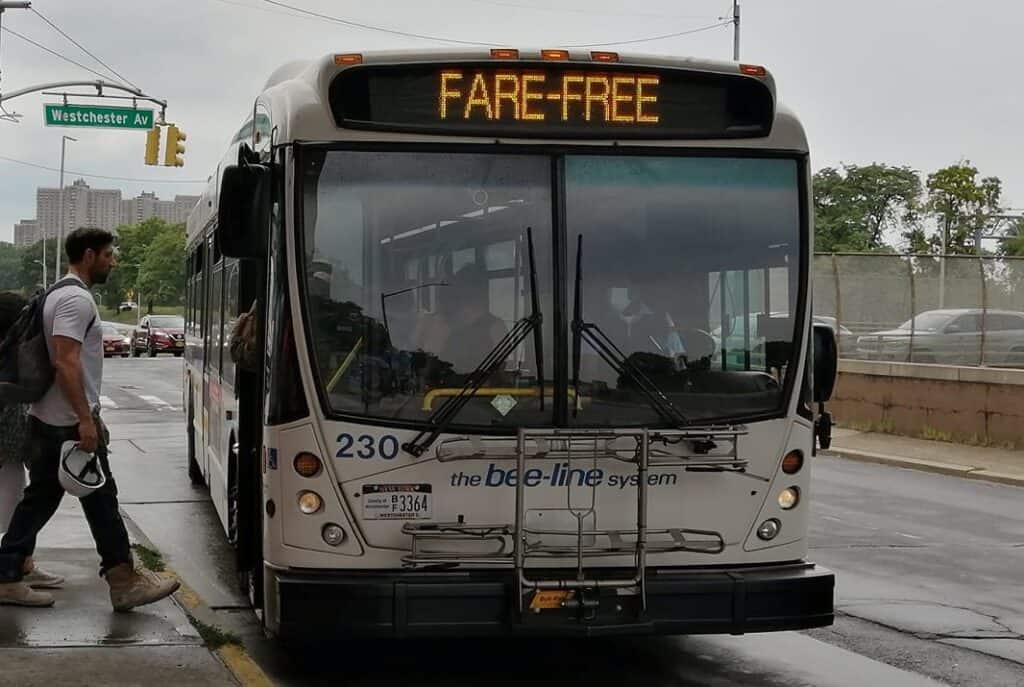
“In your zeal to find fault with our efforts, you have shown your unwillingness to be “included” but rather to sit outside the process and be critical. So be it,” -County Executive George Latimer
By Dan Murphy
For those of us who have lived in Westchester for most of our lives, the Bee Line Bus service has provided reliable and safe transportation for residents for 50 years. A public private partnership between Liberty Lines Bus Company, and Westchester County Government, is a unique one, but one that many believe has provided the best arrangement for both the taxpayer and the riders.
On October 17, the Tri-State Transportation Campaign, issued a report critical of the PPP between the county and liberty lines, but also critical of the way county government has handled bus service for its residents.
“Today, the residents of Westchester County are saddled with an antiquated, under-performing, inefficient and unaccountable bus system that is woefully inadequate for today and tomorrow’s needs…Routes are generally infrequent, do not go where lots of people want to go, and operating costs are above-average while service levels are below average. Performance metrics based on public data prove that Westchester County’s transit is inferior in most respects to the service in peer jurisdictions like Nassau County,” states the summary of the report.
The report goes on to blame the so-called “inadequacy of the Bee-Line”, on “an opaque governance system granting a permanent contract monopoly to a private company with minimal public oversight, a lack of responsiveness to evolving consumer preferences, and decades of political leadership that neglected transit riders’ needs.”
Westchester County Executive George Latimer responded to the report in a letter, dated Oct. 25 and in comments to this reporter. Latimer explained that upon taking office in 2018, his administration was not ready to cancel the PPP with Liberty Lines, but wanted to take a year to examine the operations and the needs of the people. So Latimer and Westchester County, negotiated a five-year extension with Liberty Lines, which was shorter than the usual 10-year extension.
Latimer was also able to negotiate a $20 Million cost reduction for the people and taxpayers of Westchester in the new contract. Next year, (2023), Westchester will bid out the bus contract in an RFP, with Liberty Lines and others submitting their proposals.
In his letter, Latimer was clearly not impressed with the report or the way in which they went about it. “Westchester County would like to bring to your attention areas where your three organizations have failed:
- You failed to seek County input prior to issuing your report. I have worked with advocacy organizations over a broad array of issues. I don’t always agree with the advocacy positions but it has been my experience that when an organization has criticized County operations, they have the professional courtesy to seek our input and feedback. You did not seek our input in advance of your project; you did not seek our opinion as you conducted your project.
- You failed to recognize that the current contract Westchester County has with Liberty Lines was competitively procured. The contract was RFP’d in 2013 under the former County Executive Rob Astorino for five years with the option for a five-year extension. In early 2018, after coming in to office in January, we met with Veronica Vanterpool, Laura Rossi and David Bragdon. You requested that we do a new RFP at that time, rather than exercise the extension. We informed you at that time that we were going to exercise that option but would do a new competitive procurement in 2023 when the extension expires. I gave my word to the leadership of Tri-State then and I am honoring that word now.
- You failed to do your homework. If you had reached out to us, you would have known that we have a working group to do the RFP; that we are evaluating best practices and performance measures and that we have retained TransPro to assist us in this endeavor.
- You failed to recognize the progress that the County has made over the five years of my administration:
a. We are undertaking a robust, customer driven Mobility Study which will provide necessary input for the RFP. It is important to recognize that a suburban bus transit system with various population densities is not the same as an urban bus transit system like New York City.
b. The electrification of the Bee Line bus fleet. Of our total fleet of 325 buses, 279 are electric hybrid, and 6 are full electric. The remaining 40 diesel buses will be retired over the next 12-18 months and replaced with all electric or electric hybrid. This process has already reduced air pollution from diesel exhausts at bus stops – a benefit to the riding public which you failed to recognize in your report. - You failed to recognize the compassion the County has for our customers and for the TWU employees of Liberty Lines who were our partners during COVID. The County suspended Bee Line bus fares during COVID, from March through September 2020. We installed plexi-glass dividers on every single bus and held COVID vaccine clinics at the facilities for drivers and mechanics – true essential workers.
- As a result of inflation, when I suspended the County sales tax on motor fuel, I suspended Bee Line bus fares for June, July, and August of 2022. We are the only County in New York to have done so. We are doing so again during the Thanksgiving and December Holiday season.
In summary, without benefit of a scientific sampling of ridership opinion, failing to share your report conclusions before addressing them at a public press conference, you would now like us to be responsive and inclusive in our future planning. We will be inclusive. We will include the people of Westchester County, the bus riders of the Bee Line system, the businesses and entities that benefit or could benefit from the system. In your zeal to find fault with our efforts, you have shown your unwillingness to be “included” but rather to sit outside the process and be critical. So be it,” writes Latimer.
While Latimer was critical of being “blindsided” by a report that some have viewed as “coming out of left field,” other riders we spoke to questioned what was the goal of the Tri-State Transportation Campaign’s report.
“They mentioned Nassau County but Nassau has a lot more people and gets a larger subsidy from the state for their bus service. Northern Westchester has many rural parts to it, with fewer riders. It is not an easy job to provide bus service to Westchester.”
“I would question what goal the tri-state transportation campaign has in issuing this report behind the back of our county executive? Do they want Westchester County and its taxpayers to buy a fleet of buses and hire its own drivers? What will the cost of that be? What will the bus fare for riders be? Will it be higher? Will it be double? Or was this just a hachet job? “And after two years of COVID, and all that our drivers went through, this report doesn’t seem reasonable. Sometimes a public-private partnership works and works better,” said different riders we interviewed on the #7 Bus.





